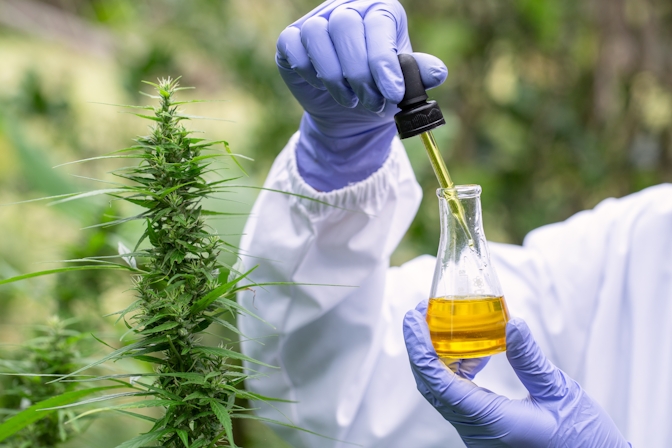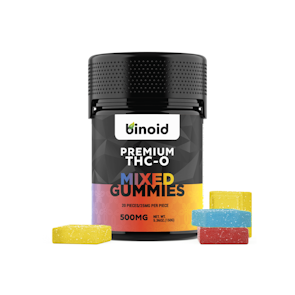
Photo by Keti Chikhladze, @immigrantstoner
Does THC-O Get You High Like Psychedelics? Demystifying The “Psychedelic Cannabinoid”
The so-called psychedelic cannabinoid might not deliver the mind-bending effects some expect.
Yes, consuming THC-O can leave you feeling just as high as regular THC products—if not higher.
THC-O (tetrahydrocannabinol-O-acetate) is one of many synthetic cannabinoids hitting dispensary shelves.
Unlike naturally occurring cannabinoids, THC-O is lab-made through a multi-step process, beginning with CBD (cannabidiol) extracted from hemp. In this process, CBD is converted to Delta-8 THC, which is then combined with acetic anhydride to create THC-O.
The appeal of THC-O lies in its potency. Dubbed the “psychedelic cannabinoid,” it appears to deliver more psychedelic-like effects than typical cannabinoids like Delta-9-tetrahydrocannabinol (THC) or CBD.
THC-O is believed to be about three times stronger than Delta-9 THC and five times stronger than Delta-8, which may explain the intense highs some users report.
But does THC-O really deliver the psychedelic experience people claim it does?

Photo by Tinnakorn / Adobe Stock Photo
Is THC-O A Psychedelic?
No, THC-O is not a psychedelic substance.
Although it’s often marketed as the “psychedelic cannabinoid,” the truth is more nuanced. THC-O was first identified in 1949 and initially investigated by the U.S. Army as a non-lethal intoxicant. By 1974, it made its way into D. Gold’s Cannabis Alchemy: Art of Modern Hashmaking, where the author later described THC-O as “more spiritual and psychedelic than ordinary substances.”
This mention might be the origin of the misconception that THC-O belongs in the same category as well-known psychedelics like psilocybin mushrooms or LSD.
However, there’s little evidence to support THC-O’s classification as a psychedelic. Psychedelic substances typically act on serotonin receptors in the brain, especially the 5-HT2A receptors, which influence sensory perception and cognition.
These receptors are responsible for the classic visual and auditory changes associated with a psychedelic trip—like what you’d experience with psilocybin or LSD. So far, there’s no indication that THC-O interacts with these receptors in any meaningful way.
A recent study in the Journal of Psychoactive Drugs confirms that THC-O’s reputation as a psychedelic is largely exaggerated. Researchers surveyed over 300 THC-O users, and 79% reported that THC-O was “not at all” or only “a little” psychedelic.
Instead, users most commonly report effects similar to those of regular cannabis, such as:
- Relaxation
- Elevated euphoria
- Pain relief
These effects align more with the typical experience of THC rather than a psychedelic substance.
What Is A THC-O High Like? Effects of THC-O

Photo by Keti Chikhladze, @immigrantstoner
The consensus from user-focused forums like Reddit mirrors the findings from the above study. Most users describe THC-O as delivering a cerebral high or a slightly enhanced version of standard THC effects. Others even say it feels indistinguishable from traditional THC products, reinforcing the idea that THC-O, while potent, doesn’t provide the mind-altering experiences associated with psychedelics.
Common effects of consuming THC-O may include:
- Increased euphoria and relaxation
- Pain relief
- Difficulty concentrating
- Altered perception of time
- Increased anxiety or paranoia
- Increased appetite
- Drowsiness
- Dry mouth
- Bloodshot eyes
What States Is THC-O Legal In?

Photo by Keti Chikhladze, @immigrantstoner
As of 2023, THC-O is federally illegal in the U.S.
The 2018 Farm Bill, a law that legalized hemp-derived cannabis products containing 0.3% THC or less, doesn’t apply to THC-O. Since it’s synthetic and produced in a lab, THC-O falls outside the bill’s definition of hemp. However, the legal status of THC-O still varies by state, with some states imposing stricter regulations while others remain more lenient.
In 2024, THC-O legal states include:
- Connecticut
- Florida
- Georgia
- Hawaii
- Illinois
- Indiana
- Kansas
- Kentucky
- Louisiana
- Maine
- Maryland
- Massachusetts
- Michigan
- Nebraska
- Nevada
- New Jersey
- New Mexico
- North Carolina
- Ohio
- Oklahoma
- Oregon
- Pennsylvania
- South Carolina
- South Dakota
- Tennessee
- Texas
- Virginia
- Washington
- West Virginia
- Wyoming
It’s always a good idea to stay updated on state-specific restrictions for cannabis products, including THC-O, before using them.
Herb Recommended Products:
READ MORE














